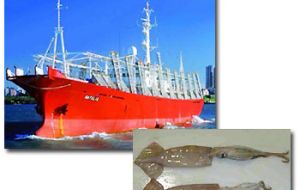MercoPress. South Atlantic News Agency
Falklands' loligo squid stocks show healthy status
 Loligo catches even suprised the scientists<br>Photo FIS
Loligo catches even suprised the scientists<br>Photo FIS Another successful Loligo squid season has made history in the Falkland Islands with the total production of almost 25,000 tons of high quality squid. This was despite discouraging prospects previous to the season.
The biomass survey conducted on board the commercial trawler Golden Chichatwo weeks before the start of the season actually found only about 9.000 tons of squid. Our analysis of oceanographic data showed that the environment did its trick with water temperature again affecting the distribution of squid, being similar to the situation last year. Colder than usual, waters of the Falkland Current occupied the fishing grounds delaying the migrations of squid. Loligo stayed longer in warmer near shore waters, growing faster but being 'invisible' to the commercial trawl survey. Usually these squid are spotted during the standard research cruise in February, but this year it did not happened as the Doradawas no longer available. Despite uncertainties about the stock biomass, it was decided to start the season on time on February 24, keeping a close eye on migrating squid. Sixteen trawlers began fishing in a rather small area to the northeast of Beauchene Island, where the densest aggregations of squid had been found during the biomass survey. Fortunately, the squid carried on their migrations to the area enabling the fleet to have impressive average daily catches of 40 tons per vessel. Maximum catches peaked at 66 metric tons per day, meaning that many trawlers fished up to their daily freezing capacities. After twenty days of heavy exploitation, squid stocks near Beauchene Island were quite depleted. Catches dropped to 10-12 tons per day. Trawlers searched for squid and found aggregations in the northern part (30-40 tons per day), and then in the central part of the Loligo box (35-40 tons per day). Almost all Loligo vessels fished in the central part until the end of March, having stable catches of squid without any sign of depletion. The first week of April saw a decrease in catches, and the vessels moved again to the northern and southern areas, having an average of 20-25 tons per day. In-season stock assessment did not show any significant risk that the spawning stock biomass could be lower than the target of 10,000 tons and therefore the season finished as planned on April 14. Average squid size (~12 cm mantle length) was one of the most desirable for the market. The results of the last four 'first' seasons in the Loligo fishery showed that conservation measures implemented by resource managers in 2003 were a success. Between 1995 and 2002, catches during the first season had a worrying declining trend, and it was decided to reduce the exploitation of the first Loligo cohort by cutting the fishing effort almost by half. It meant that the first season had to be shortened to only six weeks, running from February 24 to April 14. Exploitation of Loligo was confined to their most productive period of fast growth, with stocks being protected both at young age (in February) and during their spawning period (May-June). As a result, the biomass of squid has stabilized and then begun to increase producing better results for all. This includes the Falkland ecosystem as Loligo squid are prey for many marine birds, seals and demersal fish. Moreover, fishing during the productive period gives 'best value for money' to fishing companies, increasing effectiveness of their vessels in face of rocketing fuel prices, and having stable quantities of squid for the market. Overall, the recent development and implementation of pre-recruit surveys, electronic logbooks, and daily monitoring of the fishery with "up to the minute" reports on stock status by the Fisheries Department contributed greatly to the successful management of one of the most important domestic resources of squid around the Falkland Islands. By Alexander Arkhipkin, Senior Fisheries Scientist - Penguin News




Top Comments
Disclaimer & comment rulesCommenting for this story is now closed.
If you have a Facebook account, become a fan and comment on our Facebook Page!